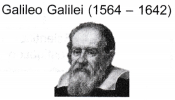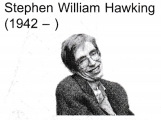Understanding Physics

- How does a rocket fly into the outer space? How does a boat float on the sea? How do kids jump about using pogo sticks? All these questions and many other daily observations are related to physics concepts.
- Physics is a branch of science concerning the study of natural phenomena; the properties of matter and energy. Some examples of natural phenomena are lightning and thunder, sea waves and tides, rain and sunshine, earthquakes and hurricanes.
- The word physics comes from the Latin word physica meaning the science of natural things. Up to the nineteenth century, physics was called natural philosophy.
- Physics is based on experimental observations and quantitative measurements.
| Some of the Greatest Physicists in the World | |
 | He was an Italian physicist who has been called the “Father of Modern Physics” and the “Father of Modern Science”. His contributions to observational astronomy include the telescopic confirmation of the phases of Venus, the discovery of the four largest satellites of Jupiter, and the observation and analysis of sunspots. |
 | He was an English physicist who is widely regarded as one of the most influential scientists of all time. His book Mathematical Principles of Natural Philosophy, laid the foundations for most of classical mechanics. In this book, Newton formulated the laws of motion and universal gravitation. Newton also built the first practical reflecting telescope. |
 | He was a French physicist who made important contributions to the study of fluids, and clarified the concepts of pressure and vacuum. While still a young man, he invented the mechanical calculator. |
 | He was a Swiss physicist who is particularly remembered for his application of mathematics to mechanics, especially fluid mechanics. His name is commemorated in the Bernoulli principle, which explains the operation of two important technologies of the 20th century: the carburetor and the airplane wing. |
 | He was a German-born theoretical physicist who developed the general theory of relativity. He is best known for his mass-energy equivalence formula E = mc2 which has been dubbed “the world’s most famous equation”. He also discovered the law of the photoelectric effect which was pivotal in establishing the quantum theory. |
 | He is an English theoretical physicist who has made significant contributions in the field of gravity, relativity, black holes and quantum mechanics. Hawking has a motor neuron disease that causes him almost entirely paralysed and he communicates through a speech generation device. Hawking has achieved success with works of popular science including his worldwide bestseller book ‘A Brief History of Time’. |
Fields of Study in Physics

